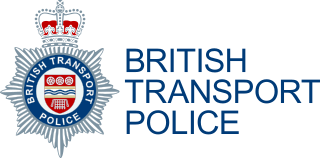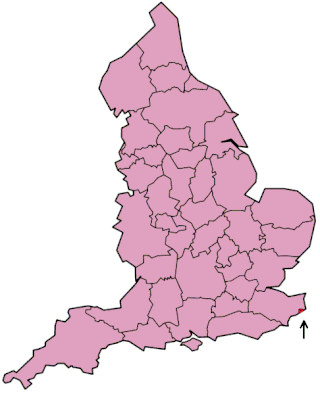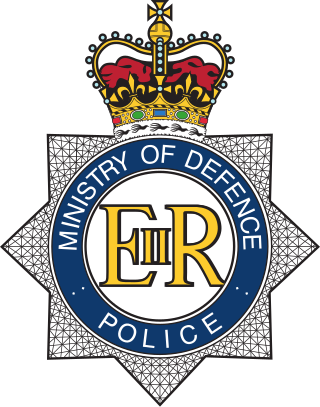Related Research Articles
A citizen's arrest is an arrest made by a private citizen – that is, a person who is not acting as a sworn law-enforcement official. In common law jurisdictions, the practice dates back to medieval England and the English common law, in which sheriffs encouraged ordinary citizens to help apprehend law breakers.

British Transport Police is a national special police force that polices the railway network of England, Wales and Scotland. The force polices more than 10,000 miles of track and more than 3,000 stations and depots.

Law enforcement in the United Kingdom is organised separately in each of the legal systems of the United Kingdom: England and Wales, Northern Ireland and Scotland. Most law enforcement is carried out by police officers serving in regional police services within one of those jurisdictions. These regional services are complemented by UK-wide agencies, such as the National Crime Agency and the national specialist units of certain territorial police forces, such as the Specialist Operations directorate of the Metropolitan Police.
Special police usually describes a police force or unit within a police force whose duties and responsibilities are significantly different from other forces in the same country or from other police in the same force, although there is no consistent international definition. A special constable, in most cases, is not a member of a special police force (SPF); in countries in the Commonwealth of Nations and often elsewhere, a special constable is a voluntary or part-time member of a national or local police force or a person involved in law enforcement who is not a police officer but has some of the powers of a police officer.
A police community support officer, or as written in legislation community support officer is a uniformed member of police staff in England and Wales, a role created by Section 38(2) of the Police Reform Act 2002, which was given Royal Assent by Queen Elizabeth II on 24 July 2002. They are non-warranted but provided with a variety of police powers and the power of a constable in various instances by the forty-three territorial police forces in England and Wales and the British Transport Police.

Law enforcement in Australia is one of the three major components of the country's justice system, along with courts and corrections. Law enforcement officers are employed by all three levels of government – federal, state/territory, and local.

The Civil Nuclear Constabulary (CNC) is a special police force responsible for providing law enforcement and security at any relevant nuclear site and for security of nuclear materials in transit within the United Kingdom. The force has over 1,500 police officers and support staff. Officers within the force are authorised firearms officers, due to the nature of the industry the force protects.
The Epping Forest Keepers are an ancient and historic body of people who are employed by the City of London, who in return are responsible, on behalf of the Conservators, for the management and care of Epping Forest, which covers approximately ten square miles of forest, bridleway, woodland and recreational space stretching from Forest Gate in east London, north to North Weald in Essex. The forest is managed by the City of London Corporation and is one of many open spaces that comes under their control that is outside the Square Mile that are maintained by the Corporation of London at no expense to the taxpayer.

Wandsworth Parks and Events Police is a Wandsworth Borough Council service responsible for the routine patrolling of the parks, commons, and open spaces within the London Borough of Wandsworth, which has more green spaces than any other inner London borough. It also enforces byelaws, dog control orders, and other park regulations, and provides policing for special events. Its lineage may be traced to a 1984 foundation, although the present body dates from 2012, and was rebranded in 2015 with its current name and responsibilities.

The Port of Tilbury Police is a non-Home Office ports police force responsible for the Port of Tilbury, and Tilbury 2 owned by the Port of Tilbury London Ltd, a subsidiary of Forth Ports plc. The force consists of a Chief of Police, Police Inspector, three Police Sergeants and ten Police Constables.
It is usual for police officers take an oath to uphold the law. The following is a selection from different countries.
An immigration officer is a law enforcement official whose job is to ensure that immigration legislation is enforced. This can cover the rules of entry for visa applicants, foreign nationals or those seeking asylum at the border, detecting and apprehending those that have breached the border and removing them, or pursuing those in breach of immigration and criminal laws.
A court security officer is, in England and Wales, a person employed by either the Lord Chancellor/Secretary of State for Justice or a private company as a "court officer" and designated by the Lord Chancellor under section 51 (1) of the Courts Act 2003:
The Lord Chancellor may appoint such officers and other staff as appear to him appropriate for the purpose of discharging his general duty in relation to the courts.
Civilian enforcement officers (CEOs) are either employees or authorised officers of His Majesty's Courts & Tribunals Service and are responsible for enforcing magistrates' court orders. They can seize and sell goods to recover money owed under a fine and community penalty notice. They also execute, in England and Wales, warrants of arrest, committal, detention and distraint. Members of approved enforcement agencies have the same powers as civilian enforcement officers, but are employed by private companies. Both are referred to as 'authorised officers' in law.

In the United Kingdom, the term military police refers to the three branches of the service police. Often, the term 'military police' is considered synonymous with the Army's Royal Military Police, but in fact, has a wider context. There are a number of civilian police forces whose role is to police other parts of the Defence Estate in the UK and overseas, but such forces are not correctly referred to as military police.
The powers of the police in Scotland, as with much of Scots law, are based on mixed elements of statute law and common law.
The powers of the police in England and Wales are defined largely by statute law, with the main sources of power being the Police and Criminal Evidence Act 1984 and the Police Act 1996. This article covers the powers of police officers of territorial police forces only, but a police officer in one of the UK's special police forces can utilise extended jurisdiction powers outside of their normal jurisdiction in certain defined situations as set out in statute. In law, police powers are given to constables. All police officers in England and Wales are "constables" in law whatever their rank. Certain police powers are also available to a limited extent to police community support officers and other non warranted positions such as police civilian investigators or designated detention officers employed by some police forces even though they are not constables.
The Ministry of Defence Police (MDP) in the United Kingdom can trace its origins back to 1686, and has gone through a number of evolutions over the centuries to achieve its present-day form. Until late 1965, the Royal Navy, British Army and Royal Air Force were controlled by separate departments: the Board of Admiralty, the Army Board and the Air Ministry respectively, each had its own Cabinet Minister. In that year it was decided that the three services should be placed under the control of one Minister of State for Defence, and the present Ministry of Defence was formed.

The Ministry of Defence Police (MDP) is a civilian special police force which is part of the United Kingdom's Ministry of Defence. The MDP's primary responsibilities are to provide armed security and counter terrorism services to designated high-risk areas, as well as uniformed policing and limited investigative services to Ministry of Defence property, personnel, and installations throughout the United Kingdom. The MDP are not military police and should not be confused with the Royal Military Police or any other British Service Police. Service personnel often refer to the MDP by the nickname "MOD plod".
References
- ↑ "Ministry of Defence Police Act 1987". Statutelaw.gov.uk. Retrieved 2013-10-08.
- ↑ "Ministry of Defence Police Act 1987". Statutelaw.gov.uk. Retrieved 2013-10-08.
- ↑ "Ministry of Defence Police Act 1987". Statutelaw.gov.uk. Retrieved 2013-10-08.
- 1 2 3 4 5 6 7 "Ministry of Defence Police Act 1987, section 2". Statutelaw.gov.uk. Retrieved 2013-10-08.
- ↑ "Ministry of Defence Police Act 1987". Statutelaw.gov.uk. Retrieved 2013-10-08.
- ↑ Talkthrough magazine 124 Page 4 Archived July 10, 2008, at the Wayback Machine